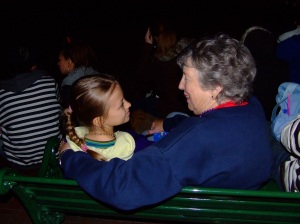I had an opportunity on Easter Sunday to speak briefly to the nursing staff on the floor of the hospital where my mom was being treated. About seven or eight nurses and others gathered with me in a back room for a time of Scripture reading and prayer. I am very glad for this opportunity, first of all because it gave me an opportunity to share the good news of Jesus’ resurrection. But I am also glad because it gave me a moment of reflection on the resurrection that helped me to better understand the place of healing and death in the life of the believer.
After the death of Anna I had a strong sense that Anna’s final state was a good thing. Anna, being absent from the body, is present with the Lord. Being present with the Lord is a good thing. The question I had to ask myself at that time was, if it is true that to be present with the Lord is better than our state now, if as Paul says, to live is Christ and to die is gain, then why don’t we all kill ourselves in order to be with the Lord? Or, put another way, why do we hold on to life so dearly? Why do we fight death at the moment it appears? I recall a passage from a book I read while in seminary that dealt with the issues of death and dying. The author told a story, I believe it was supposed to be a true story, about an incident in the 19th century when an American Indian chief was being tried by the army and had been sentenced to die by execution. At the hanging, a minister was present who gave a brief sermon about the afterlife and about the goodness of being with the Lord. He contrasted the fallenness of this world with its sickness and problems with the blessedness of being with the Lord. After he finished the Indian chief calmly said to him, “If that is true, then why don’t we switch places. I like it here.” The author concluded his story not with the simple distinction between the Native American and Christian view of death, but instead by noting that the minister in the story hurriedly refused the offer, saying that it was not possible to switch places. The author of the book noted the paradox of the minister’s position. If what he said about death and the blessedness of being with the Lord was true, then why did he so instinctively and tenaciously hang on to life?
I think I discovered my own answer to that question on Easter morning while I was talking to the nurses. I told them that my mother was in the hospital because of her cancer. She is very sick. I hope and pray that she walks out of the hospital and lives to see another Easter next year. But in the end, whether it is this year or next, my mother will die. In fact, every patient that those nurses and doctors treat will die. I explained to them that if they are in the business of fighting death, they will lose 100% of the time. Every one of their patients, without exception, will die.
But if we can look forward to the resurrection as a time of restoration, as a time of ultimate healing from the sickness and corruption of this world, then we can begin to see that our little healings along the way are slight glimmers God gives us now so that we will understand the final healing to come. In other words, each one of us will die. Each one of us will be raised from the dead at the second coming of Christ. Some will be raised to eternal life and some to eternal damnation, but all will be raised to live again. In God’s coming kingdom there will be no sickness and death. There will be no need for healing. But healing in this life serves the same function in our physical bodies as our acts of righteousness do in terms of our sanctified soul. We are not yet fully sanctified. We are not without sin. But we strive toward that knowing that at the resurrection all will be made right. We don’t abandon our efforts at goodness simply because we know that we will not be perfect. In the same way, we do not abandon our bodies to sickness and disease simply because we know that in the end we will die. Instead, the healing that takes place in our bodies is a foretaste of the disease-free life we will live when God’s Kingdom is finally established.
So I told the health care workers on Easter Sunday that if they are fighting against death, they are doomed to fail 100% of the time, because every one of their patients will be claimed by death eventually. But if, instead, they see their work as a partnership with God to bring about small hints and foretastes of the resurrection and God’ eventual victory over death, then they will succeed 100% of the time. Because whether their patient lives to see another day, or dies during treatment, they are working not as fight against death, but as a precursor to the resurrection.
Anna Resurget. Anna will rise again.
